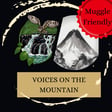Become a Creator today!Start creating today - Share your story with the world!
Start for free
00:00:00
00:00:01

Wu Xing and Climate
Into the archives of the short little life of our podcasts we go:
In the beginning, Steven and I were vamping on some Wu Xing ideas, and then we decided to hit record....
Wu Xing or 5 Phases as it is often translated, is a philosophy at the core of Chinese thought. If Yin and Yang are like dancing a two step, Wu Xing is like the tango. And once you adopt this lens you can apply it anywhere, in the garden, in relationships, in the seasons and the clinic. Life unfolds according to the patterns and principles of Wu Xing. Join us as we play and dance with Wu Xing.
Transcript
Introduction to Metal and Wuxing Cycle
00:00:09
Speaker
All right, we're back. We're having a quick little conversation about metal and the natural world and the Wuxing cycle. Steven, do you want to start with your catastrophe and climate change Wuxing?
Steven's Journey in Chinese Medicine
00:00:28
Speaker
Yeah, man. Yeah, I think that's a good one. Also, there's something that it's interesting
00:00:33
Speaker
Because I was in Chinese medicine school for much longer than one probably should be. But after the first four years, it's the master's degree there, which is actually the equivalent of the PhD here, or the doctor, whatever you want to call it. I still didn't feel like I had it, so I had to stay for four more.
00:00:52
Speaker
pros and
Understanding the Generating Cycle in Wuxing
00:00:53
Speaker
cons to that. Just shout out to you guys stuck in China. Anyway, part of the reason it was interesting because I think anyone who first hears about this five element cycle, you're like, okay, the generating cycle and what's sometimes called the controlling cycle, though that's a bit of a mistranslation we can get to, but the generating cycle is real. And so when it comes to the generating cycle, it's literally birthing the following element. So I think we can all be like, okay, yeah, we see wood.
00:01:20
Speaker
We birth fire. That makes sense. You burn the wood. Fire. You burn the wood down. You're left with ash. That's like earth, right? So ash and earth, same thing. And then you're like, okay, out of the ash or out of the earth, we're going to dig metal. But how in the heck do you get from metal to water? And nobody has ever explained that to me. Oh, yeah, let me hear it.
Theories on Metal to Water Transformation
00:01:42
Speaker
Water condenses on metal.
00:01:44
Speaker
Oh, I like yours because I've heard that people be like, I'm going to use metal to dig for a well. I was like, okay. But you're like yours. Water condenses on metal. And the second one would be that the upper atmosphere could be metal too.
00:01:58
Speaker
Because this is what separates the earth, like our atmosphere and space. And so sometimes I think of metal as this like in between thing. That's a barrier. Yeah. And then that would be a canopy that then condenses and then pushes back. Oh, getting a canopy word in for ancient long stuff too. Okay, I dig that. And my martial arts teacher though, he dropped a third.
00:02:22
Speaker
bomb on me. Well, I'm saying third bomb. The first two are coming from Asher. A lot of bomb going on over here. All positive bombs, by the way. So the one that came from my martial arts teacher, his name is Gao Lao Shi in Beijing in case you guys want to study with an incredible Bagua teacher.
00:02:39
Speaker
Anyway, he was like, well, what happens when you melt metal? You get water, you get like liquid and I was like, oh snap, right? Anyone who's played with mercury, hopefully not a lot of you, but you all know it's, uh, it is pretty watery looking. So that does, yeah. And then of course, you know, water grows trees, so,
Productive vs. Pathological Cycles
00:02:59
Speaker
so forth.
00:02:59
Speaker
So that's kind of like talking about the element of what becomes liquid in a way too. But I really like how you said condenses on metal as well. Yeah. And you can even go into like the properties of like the electrons, sea of electrons and all that. And we will. Oh yeah. The whole point is like TCM geeks, right? Geeks. Oh yeah. So we're going to go to climate way. So it's interesting because if you look at all five of these, um,
00:03:28
Speaker
then you can also see how they generate one another, but they also can generate pathological things as well. So that's both in this generating cycle and then the controlling cycle. We shouted out to that a little bit earlier. That's a little bit
The Liver's Role in Body Transportation
00:03:41
Speaker
tricky because controlling is often thought of as a negative thing.
00:03:44
Speaker
But if you think about, say, a liver's function on a spleen, it's actually the most, and I'm being very clear here, the number one most important thing for transportation is not in a spleen or a stomach. The number one most important thing is the liver gallbladder. So it's not even, so I know I've heard since I got back that people call TNT, a middle burner function, it's not true. It's T in one third T. The other two thirds of the transportation comes from the liver gallbladder.
00:04:14
Speaker
You can see people whose their middle burner transportation shuts down and they still digest okay. But anyone whose transportation shuts down from the liver gallbladder side, they're guaranteed transportation and digestive problems. So that's a tricky one where if it's not controlling, it's actually moderating or assisting. It's like too much water is not good for irrigation. So it's that kind of control. It's like helping it not overdo things or underdo things.
00:04:44
Speaker
So whatever that comes out to, I don't think that's what people are envisioning when they say control. I would call it more like assisting, moderating, balancing function. Regulating. Regulating. This is really what that one jump cycle is.
00:04:58
Speaker
We were lucky. Our first teacher who taught us the küh cycle told us that it was virtuous and it wasn't a negative thing. Of course, it can be when it's overacting, but in its balanced state, it's a virtuous one.
00:05:17
Speaker
You can't tell a story, I think, about the Wuxing controlling cycle. You know, water puts out fire, fire amounts metal, metal cuts down wood, roots grow through the earth, and then the earth actually contains all the water on this earth. So true. And if that's done in the right amount, it's regulating, right? Yeah. So true. And that's, you even said the Chinese one, that's solid, dude. Ku is the word we use for that. Ku.
00:05:43
Speaker
But when it becomes pathological, we no longer use that word. We use the word cheng. Is that insulting or is that a different one? It's the same jump. So like liver not helping for a spleen would be moo cheng tu. Whereas if it's helping spleen, same dynamic but it's moo ku tu.
00:06:05
Speaker
Ah, beautiful. So climate pathology. Oh, yeah, climate pathology. So here we go.
Climate Pathology and Wuxing Cycle
00:06:12
Speaker
So when it comes to climate pathology, you have to think about the four different seasons. And therefore, the five different zang, we'll get to that in just a second. But the spleen is encountered in there. And then it's associated climatic function or element. And then it's how balance is done.
00:06:34
Speaker
Yeah, so the first thing is...
00:06:36
Speaker
We got some wood, and wood, of course, is spring, spring is wind. And so when it gets to climate change and extreme weather events, or sometimes what we'll actually refer to as shu weather, I know for you other geeks out there, you'll know that shu is also translated as deficient or vacuity deficiency as well, now and wise. But in terms of, and this is from the Nijing even, but when we talk about a climate being shu, it either means in its untimely season,
00:07:05
Speaker
or in an extreme weather pattern. So the extreme weather pattern would be not a good breeze wind that's helping everybody feel more young and ready to grow in the spring, but of course, extreme winds like high winds, tornadoes, things like that. And we've been seeing that, right? The winds are kicking up really high and then we would know, okay, well, what happens if we get a particularly windy year
00:07:28
Speaker
it generates the next catastrophe which is forest fires go nuts right so the fire is not just existing but it's way too big so you get these giant forest fires what happens with giant forest fires we actually go then into the spleen so this is where we would put that fifth time period which technically relates to all four but it's reach ticket in the middle here because of earth
00:07:52
Speaker
And I never figured this out until I came back to Colorado. After you get fires, you get fire scars. And once you get fire scars on the earth, it no longer absorbs water and it just turns into these mudslides. And so we had these crazy mudslides a couple of years ago. I was like, that's what they're talking about.
00:08:08
Speaker
Then after you get the mud slides, you generate, again, these slicking. I think it creates basically a plaster-like thing on the soil because it turns it into mud, kind of like concrete-y stuff, but not quite as intense. That's what causes all the water, inability to absorb water. It's a clay that them just got
00:08:30
Speaker
just seals it on top. Yeah. Yeah. Clay just bonds to itself. Then it's, I mean, this is how you make a clay pot. Right.
00:08:39
Speaker
Right. And just all the water doesn't get, it just can't sink in. And then we're stuck with a drought from the ground up. And then interestingly from droughts, we seem to have incredibly wet years following those. Um, and that would be the floods then that come up and then floods still in excess. Then we generate more crazy, windy things and so forth. So we get like the extreme version of the weather events, as opposed to like the healthy ones that are building stuff in our body.
00:09:08
Speaker
Absolutely. That's the beautiful thing about this. I don't think about it as just some medicine. It's like a perspective on the world. And you can use it anywhere you look. Totally. Totally. So this brought up interesting things for me because I always struggle with how metal is in the natural world. It's not just copper or gold or silver. It is those things that are conductive.
00:09:36
Speaker
But so I've been wondering if clay is an accurate translation or is an okay idea for looking at metal in the natural world.
Clay's Characteristics in Metal and Earth Elements
00:09:45
Speaker
And clay is the actual, it's the smallest particle of a soil. And so on the bigger scale, you'll have gravel and you go down to sand. And then as you get smaller and smaller, you get silt and you get clay.
00:09:57
Speaker
And so clay is all surface area where gravel, you know, you could break it apart and it's, you know, a couple million pieces of sand and then a couple million pieces of sand or these pieces of silt and then a couple million more of clay. So clay is really sticky because it's so small. It'll stick to everything.
00:10:15
Speaker
And so part of its virtue is that in healthy soil, it will stick to water and nutrients and hold that in and then create space for microorganisms to do their thing. But in that it's the smallest, you know, piece of earth that you could ever have. It's kind of like that's what all earths will turn into eventually.
00:10:39
Speaker
And so Earth, you know, giving birth to metal is like, oh, is that like just a very earthy type metal thing that is then sticking to water and helping with this exchange in and out of different reactions happening in the soil? I love that. That just sounds like it fits the cycle. I mean, I didn't know any of that stuff that you're talking about with the soil science. So that's awesome. Obviously, we know you worked that stuff good.
00:11:03
Speaker
But yeah, that's a solid point. It's an interesting thing though, because when it comes to sticky, you're absolutely right that the lungs need some fluids. I wonder if there's a way to interpret or understand the fragility of a lung through clay too. Because no fluids, no lung function. Too much fluids, no lung function. Yeah, not enough and it's too weak. Yeah.
00:11:34
Speaker
Yeah, it's really good. I dig it. Yeah, I think I can roll with that. That sounds great to me. Yeah, there's another bit too where there's a cat eye on exchange. So like how the clay actually bonds is through freeing up electrons, which is the same way that metal is conduct. Oh, that's so fascinating. So it's sharing like the free electrons that are running around in metal. Yeah, it's making like a bunch of ionic bonds is how it does it.
00:12:03
Speaker
How interesting between different parts of clay? Well, between clay and other things or between clay in itself, which is that, you know, it does that too much. And then you get, we talked about the kind of plate on the surface or the, it also won't give up stuff to the, if like your soil is too clay, you have to add in all these things to aerate it so that it will give up its nutrients to plants. Ah.
00:12:30
Speaker
Greedy lungs? Are we thinking metals, the greedy side of that? Yeah. I guess so. Work just doesn't know how to let go. It's just like too stuck. Or like you said, I mean, that kind of clicks into the fragility of it too. Too much clay, too little clay. Can't hold on the water or too much water. Very similar to what we need to do physiologically for a long. That's even balanced. Even Western medicine would agree.
00:12:56
Speaker
When you don't have the right amount of water at the surface of a lung, you don't get diffusion nearly as well as you should. And that actually brings up an interesting one too, because you just set the surface of it, which is like going to the Bagua. That's the, I'm going to butcher this. Dewey, the lake.
00:13:15
Speaker
Dui. Dui. Dui. Yeah. Yeah. Where the, what? Is it, yin is resting on top of two yang lines? Is that, am I getting that right? Yes. Yes. Yes. Yes. And it means like a mountain swamp, basically. Exactly. Like water. Yeah. Shifting. So higher versus lower. And hence the yin is up high. Exactly.
00:13:42
Speaker
Yeah, that's true. That does kind of correlate to that. You're talking about the shifting in the cation still, or no, the fragility of it. The fragility of it, it being the surface thing that we kind of have touched on a couple of times now. Yeah. All of it. Yeah. No, I dig that. And I wonder, too, if they think about it, is it just that surface layer that we're talking about, or is it the entire lake? Because if it's just the surface layer, that makes a lot of sense to me.
00:14:11
Speaker
the whole lake seems more watery, but the differentiation between, you know, above the lake and below the lake. Yeah. And actually this ties into kind of what you were talking about before to the canopy. So the lungs are the top third of the triple burner. And if they're working right, there's never more than a thin layer of fluids up there because they're circulating the rest down the body. So it's kind of like, yeah, the top of the lake and the rest of the lake would more or less be considered the triple burner.
00:14:40
Speaker
Oh, Asher, great point on clay being the smallest particle and having that sticky, cloying nature. And this actually ties us into two cool things. So I love how you're tying that to the metal concept of free-flowing electrons, protons, charge, and so forth. And it also really ties into being Earth.
00:15:02
Speaker
the element of Earth and the pathogen of Earth, which really is called the Chi of Earth, but in excess is called a pathogen, which is dampness. So there is a place for dampness. It has to come after dry seasons, otherwise there's no way for us to moisten things, keep the yang from ascending forever, and we have to bring that yang back down. So there is a reason why dampness generally needs to happen at the end of summer to kind of bring the yang back down, as it should be, as it's descending towards
00:15:31
Speaker
receding and then eventually storing through the fall and the winter. But the key here is that cloying nature of dampness is very similar to what you just mentioned as the cloying nature of clay. It holds on fluids, it holds things, which is why in excess, which is unfortunately what most people spleen is in modern countries, they're really all about holding that fluid into their stomach and not processing it as well.
00:15:57
Speaker
Now for truly dry people, that's exactly what they do need to do. And for a little shout out to the, you know, five flavors, five colors of food. We'll do another episode for you foodie nerds out there and just people who want to use those concepts as a general guideline for how to understand the world and eat properly and do all those things. But when it comes to the sweet flavor generating the spleen,
00:16:22
Speaker
or the earth, that's not true. That's not completely true. What it means is the sweet flavor generating the yin part of the spleen, which we call yin-nutritive fluid. And so you can see sweet flavors generate fluid in the spleen. Now that's great. If our middle burner is dry, that's great.
00:16:39
Speaker
but most of us aren't like rustic farmers trying to make make do in harsh northern china so i don't think most of us need to really amp up on the carbs and sugars but for those of people who really are fluid deficient that's exactly what they need.
00:16:56
Speaker
And then for the rest of us, we just don't want too much fluid because we can't process all that fluid. And that's the pathway to dampness. And so interestingly, when people are taking sweets and foods, both carbs, sugars, and everything else, thinking that they're tonifying their spleen, they're actually tonifying the eon fluids of their spleen, which really wrecks spleen function.
00:17:16
Speaker
Right, especially if they were trying to tonify it because they thought they had Spleen G deficiency and damp. That's right. Very much like what we all had in school and we were always told to have Kanji for breakfast. Now, I had a question. If we do have a damp environment, let's say we have a sticky Spleen.
Transforming Dampness in TCM
00:17:32
Speaker
Yes. How do we break that up? What's our idea? Transform and move.
00:17:38
Speaker
That's our biggie. So when it comes to how do you break up that cloying, sticky nature in the middle, you transform it. And this is a specific word. There's, oh, this is next level. This is people who are both language and TCM nerds. Oh, don't worry. We're not forgetting your demographic out there. You, meaning whoever we're talking to, of course, not just you and me, actually, because we know where we stand.
00:18:01
Speaker
which is transform. It's one of the six key words that we use, the six key verbs. Chinese is all about the verbs. If you're going to study Chinese language, focus on the verbs. If you're going to study Chinese martial arts, focus on the verbs. If you're going to study Chinese medicine, focus on the verbs. So when it comes to how we deal with it, there's six very important verbs that we know.
00:18:23
Speaker
We won't go into all of them. That actually sounds like another episode. But the one to remember here is transform. And this is actually connected to another concept, but it's called hua. So just like we know of the concept of qi hua, hua sure means to transform damnedness. Now the two things that you want to take away from this, what does transform mean? Well, there's one thing that we can identify as an identifying factor of many of the things that do this, which is aromatic. So
00:18:53
Speaker
for those of you who know your Chinese herbs, or peppermint, tangerine peel, cardamom, these really aromatic herbs, flavors of anything really. These are the things that are actually gonna lift, enlighten, and really transform. We do use the word awaken for the spleen as well, but here we're really trying to focus on that word transform. And what it then means is to take dampness or pathological fluid
00:19:21
Speaker
Change it back into physiological fluid. It's a beautiful concept that we don't have to clear or attack the pathogen. We just need to change it back into something that's physiologically useful. And we're actually generating health at the same time as clearing a pathogen or illness.
Clay's Cloying Nature and Balance
00:19:38
Speaker
And so the two things to remember is, one is it changes pathological fluids back into good fluids. That's number one. And number two is it happens right in the middle burner. Now, technically, you could transform elsewhere. But if you do look at the category of transforming dampness herbs, they're all really primarily affecting the middle burner, which is exactly where you just asked how to do that. So that's exactly what we want to do.
00:20:01
Speaker
And it's so high up in the digestive tract, it's not very easy to pee it out. It's not super easy to circulate it out. It sure is easier to just recruit those pathological fluids back into good stuff and then follow the normal fluid pathway cycle.
00:20:18
Speaker
Oh, one last thing about that sticky nature, by the way, and I love that you brought this up because I had no idea that, I don't know, how many of us know these things? For those of you out there who want to learn TCM and you can't be TCM doctors right now, first thing you could do is be a farmer. Second thing you could be is a cook. And third thing, then just go right into Chinese medicine because you've mastered the two things that get you there.
00:20:42
Speaker
So those are two really key ones, but farmer really is the first one. So I'm going to be taking a big cue off of Asher's awesome permaculture and farming knowledge and so forth. But because you mentioned it was the smallest particle, this actually gets us back to the eting, which is that everything at its extreme turns into its opposite. So if you bring something down to its smallest particle, clay,
00:21:06
Speaker
it should shift then into the opposite. Well, what is the opposite of damp and cloying? Dry and metallic. And so you go over to the next one, which is lungs, it's dry, is the pathogen, dryness, and it's metal. And so ideally that's where the shift then happens. Totally. I'll just add, you know, other things is like the Kung Fu's, the Qi Gong's, Tai Chi, Taoist classics, Yi Qing, all these things really help
00:21:35
Speaker
prepare the mind for this perspective and this kind
Experiential Learning in TCM
00:21:38
Speaker
of way of thinking. Shout out to what Asher just said. I mean, can you imagine the difference between memorizing your channels and feeling your channels? Like one doesn't even feel like studying, you know? Yeah, that's actually how I learned the channels and points. And then you get to the test and they ask you where a point was and I just go to the body and find out my body and then guess based off of the multiple choice. And that was good enough to pass.
00:22:02
Speaker
And then the real test is in clinic, right? And being able to find that point on someone else's body. That is so true, dude. Effectively and quickly. Yeah, you see people really just nail that memorization and then have no idea of how to apply it. I like your method better where I like you're applying it from the beginning. It might not be 100% perfect to begin with, but that's the sort of thing that just gets sharper and sharper as you just practice it. Oh, will serve you for life. Oh, yeah. So solid.
00:22:28
Speaker
Shout out to our channel's episode, which will be sometime in the future. For those of you who are both Qigong and TCM nerds, if you really follow the original Nijing pathway word for word and understand where they're telling you the pathway goes, they're actually describing a body posture. Obviously, I give a big hint out that it's a Qigong posture. I'll just leave that one for all nerdies to stew on.
00:22:58
Speaker
Yeah, I'm definitely just doing that. Take care, Al.





